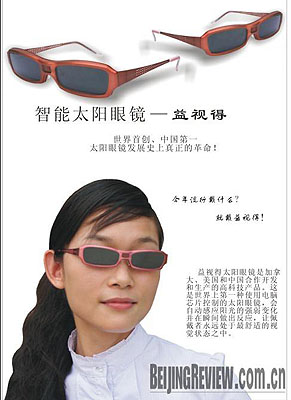|

Sunglasses are a popular fashion-accessory in China. They first became cool because of an American science fiction TV series called Man From Atlantis, which aired on CCTV, China's largest official television station, in 1980. The hero in the movie, Mark Harris, often wore a pair of sunglasses and his style was instantly imitated across the country.
Today, sunglasses have followed in the footsteps of the movie, taking a step into the realm of science fiction with the creation of intelligent spectacles. E-Shades are a new generation of sunglasses fitted with computer chips that can sense sunlight and darken accordingly, providing clearer and more comfortable vision for their wearer.
E-Shades are jointly developed and produced by manufacturers in the U.S., Canada and China. Fifteen invention patents and five application patents about intelligent sunglasses have been granted in China and the U.S. Intelligent sunglasses were showcased at the recent 2008 China International Glasses Exhibition.
Intelligent sunglasses look no different from traditional sunglasses. The only difference is that they contain a computer chip and the lenses are made of liquid crystal.
The major function of sunglasses is to protect the eyes against the ultraviolet rays in sunlight. Seven percent of the sunlight reaching the Earth is ultraviolet rays.
Wang Liru, Director of the Optical Engineering Standard Research Office of China National Institute of Standardization, cautioned that the cornea and crystalline lens of the eyes are vulnerable to ultraviolet rays, which can induce diseases such cataracts, keratitis, macula retina and chorioretinitis.
Good sunglasses can screen off over 90 percent of UV-A light whose wavelength is between 315nm and 380nm, and all UV-B light whose wavelength is between 280nm and 315nm. Wearing sunglasses can protect the eye from harmful ultraviolet radiation.
Traditional sunglasses do not have color changing or polarization functions. Although they do have dark or light lens colors, each lens color has its weakness. Sunglasses with light-colored lenses cannot effectively protect the eyes from harmful radiation. Those with dark lenses do filter away harmful radiation, but may not protect the eye from diseases such as glaucoma, because the pupils, hidden behind dark lenses, tend to dilate and malfunction.
E-Shades are controlled by computer chip and LCD technology. They are powered by solar cells. The computer chip can sense the intensity of sunlight, and adjust the electricity voltage to change lens color and hence light transmission.
E-Shades alleviate eye fatigue by filtering away glare and irregular light reflection, so are ideal for drivers. Although traditional sunglasses can protect drivers from the glare of the sun, they also weaken a drivers' vision, and sometimes make it difficult to tell the color of traffic lights.
The technology used to produce e-Shades can also be applied to other fields, such as in sunshade windows for cars and buildings. | 